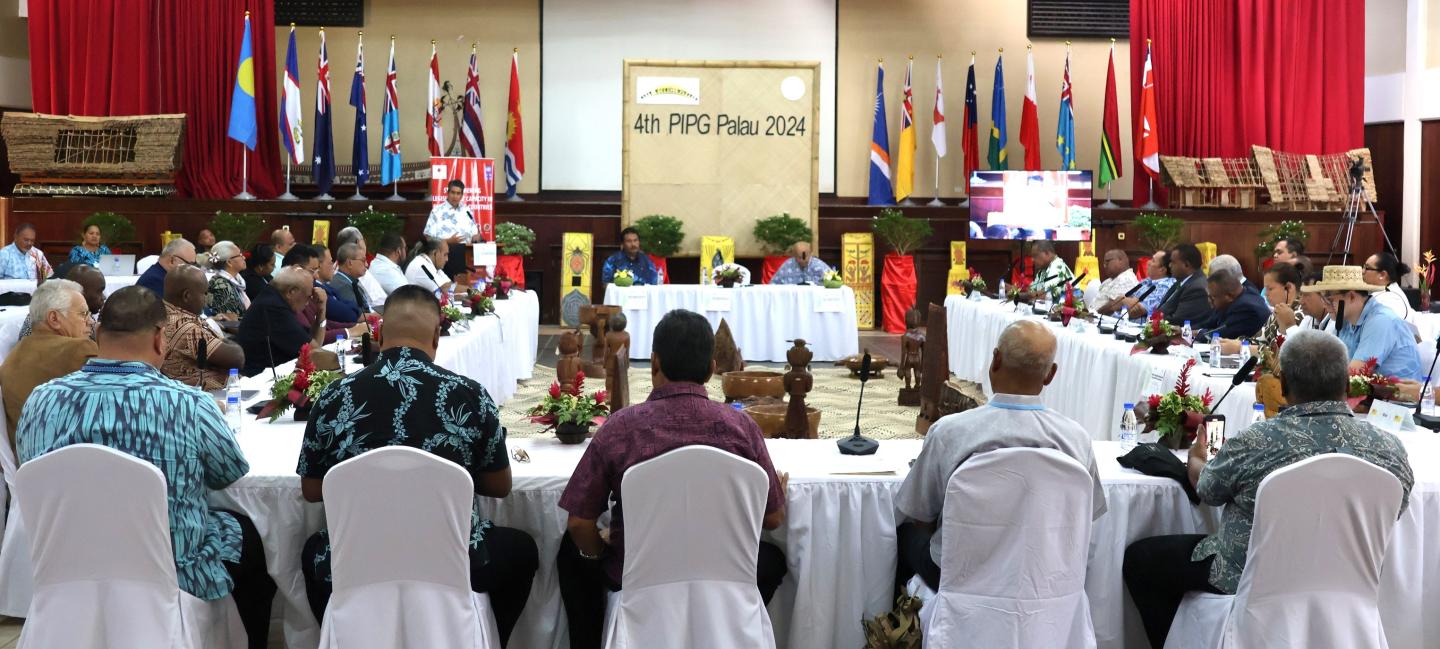By Lord Fakafanua, Speaker of the Parliament of Tonga, Munkhtuya Altangerel, Resident Representative, UNDP Pacific Office in Fiji
The vast Pacific Ocean binds our island nations, shaping our identity and sustaining countless communities. But the challenges we face, from climate change to economic disparity, and the continual erosion of faith and trust in our democratic institutions, transcend borders.
If we cast our mind back exactly a decade to the 2014 Pacific Islands Forum Leaders Meeting, those in attendance signed the Framework for Pacific Regionalism. While further agreements and strategies have been elaborated on since – eventuating in our regional blueprint, the 2050 Strategy for the Blue Pacific Continent – much of the framework still has relevance to this day.
The framework was intended to support “focused political conversations and settlements that address key strategic issues, including shared sovereignty, pooling resources and delegating decision-making.” But it is the Forum Leaders Statement from 2014 that still has so much relevance, when we think about the inherent value of regionalism for our Pacific brothers and sisters:
“We stand together as a Pacific region because there are significant benefits to sharing and combining our resources to leverage our voice, influence and competitiveness, and to overcome geographical and demographic disadvantages.”
To cast back even further than 2014, and to the time of pre-Western contact in our Pacific Island Countries, our Pacific people appear to have highly valued exchange beyond their local communities. They travelled across the vast ocean space of our Blue Pacific to not only trade goods for economic gain, but it was the exchange of social capital that was also paramount.
The term ‘kumi fonua’ carries a profound significance in Tonga. It translates to ‘in search of a new land’, encapsulating the profound journeys of the Moana people who set out across the vast ocean to discover and settle new territories.
This concept is more than a historical footnote; it is a living testament to the ingenuity and resilience of the Pacific people, known for their unparalleled seafaring skills. These voyagers navigated the open seas not by satellite or radar, but by the stars, the wind, and the feel of the water — a tradition of exploration that continues to shape the identity and culture of the Pacific people today.
Threaded across the 30,000 islands of Polynesia, Micronesia, and Melanesia, the ocean beats as the lifeblood of countless communities. It’s more than just a map feature; it’s the compass of our identity, the wellspring of our sustenance. We, the people, move in rhythm with the currents of this vast blue heart, the Pacific.
As we move forward to the present day, our discussion now focuses on how we can build a resilient Blue Pacific; a region that fosters peace and harmony, that promotes social inclusion, security and prosperity.
Our respective parliaments and all those who sit inside as representatives of our Pacific people may pass laws or engage in discourse and debate; acting as the much-needed mechanism of accountability. They are strong on their own. However, we are stronger as one in our search for the collective benefit of all. The search to ensure that we leave no Pacific person behind.
The Pacific Islands Parliaments Group (PIPG) was formed for this exact reason, the group knowing that the concept of regionalism can only work should all members believe in the ethos or ideal of moving as one.
Comprising 18 member legislatures and parliaments, the PIPG serves as the premier organisation for legislative cooperation in the Pacific Islands. It aims to address common challenges through dialogue and collaboration, focusing on issues such as climate change resilience, sustainable economic development, and cultural preservation.
The PIPG not only promotes interparliamentary relations but also serves as a crucial mechanism for Members of Parliament (MPs) to come together – parliaments housing the representatives of Pacific people – a mechanism beyond the usual fora that bring together national leaders or those solely at the ministerial level.
Through the PIPG we see a deep sense of commitment to cooperate and integrate each member parliament’s respective endeavours. We come together to talanoa, to tell stories, to engage in conversation in pursuit of a Blue Pacific that can withstand the wrath of the climate emergency, building back better and ensuring that our social fabric is not torn apart through circumstances that are largely outside of our own control.
The effectiveness of regionalism is dependent on political will and commitment; the political will of the collective only being as strong as its weakest point.
The significance of strong and long-lasting leadership and political determination in addressing the increasingly intricate geopolitical landscape and dealing with emerging challenges is evident in the history of Pacific regionalism.
Effective governance, inclusivity, and ownership will propel the execution of coordinated actions, fostering leadership and diplomatic capability and dedication to regionalism. The success of this hinges on collaborative efforts within the region, with the PIPG complementing national endeavors as well as advancing our shared aspirations and priorities as the Blue Pacific Continent.
We may come from diverse backgrounds, and be the custodians of unique customs and cultures, but it is through our diversity that we align as a unified Pacific voice.
The success of this hinges on collaborative efforts within the region. Let us all, leaders and citizens alike, embrace the spirit of ‘kumi fonua’ – the search for a better future – and work together to build a resilient Blue Pacific and a cohort of strong Pacific parliaments for generations to come.















